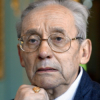Paul Ricoeur

Paul Ricoeur
Jean Paul Gustave Ricœurwas a French philosopher best known for combining phenomenological description with hermeneutics. As such, his thought is within the same tradition as other major hermeneutic phenomenologists, Martin Heidegger and Hans-Georg Gadamer. In 2000, he was awarded the Kyoto Prize in Arts and Philosophy for having "revolutionized the methods of hermeneutic phenomenology, expanding the study of textual interpretation to include the broad yet concrete domains of mythology, biblical exegesis, psychoanalysis, theory of metaphor, and narrative theory."...
NationalityFrench
ProfessionPhilosopher
Date of Birth27 February 1913
CountryFrance
It is always possible to argue against an interpretation, to confront interpretations, to arbitrate between them and to seek for an agreement, even if this agreement remains beyond our reach.
This is perhaps the most profound meaning of the book of Job, the best example of wisdom.
Ordinary language carries with it conditions of meaning which it is easy to recognize by classifying the contexts in which the expression is employed in a meaningful manner.
Narrative identity takes part in the story's movement, in the dialectic between order and disorder
Hope, insofar as it is hope of resurrection, is the living contradiction of what it proceeds from and what is placed under the sign of the Cross and death.
Beyond the desert of criticism, we wish to be called again.
First, it is not unimportant that the legislative texts of the Old Testament are placed in the mouth of Moses and within the narrative framework of the sojourn at Sinai.
But myth is something else than an explanation of the world, of history, and of destiny. Myth expresses in terms of the world - that is, of the other world or the second world - the understanding that man has of himself in relation to the foundation and the limit of his existence. Hence to demythologize is to interpret myth, that is, to relate the objective representations of the myth to the self-understanding which is both shown and concealed in it.
Testimony gives something to be interpreted.
Testimony demands to be interpreted because of the dialectic of meaning and event that traverses it
Wisdom finds its literary expression in wisdom literature.
The logic of validation allows us to move between the two limits of dogmatism and skepticism.
Although there has always been a hermeneutic problem in Christianity, the hermeneutic question today seems to us a new one.
The dictionary contains no metaphors.